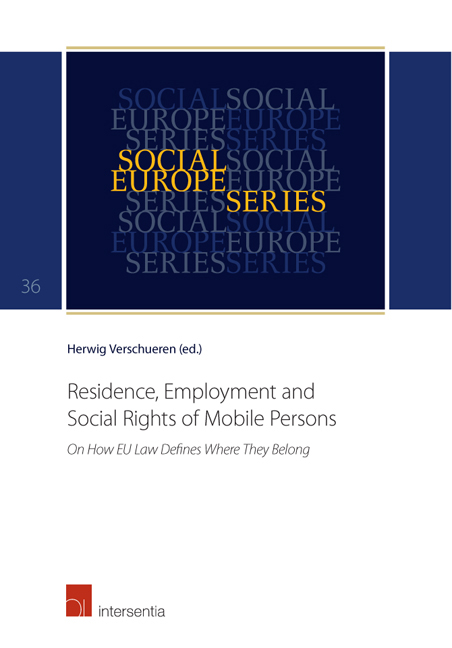Book contents
- Frontmatter
- Preface
- Contents
- List of Abbreviations
- List of Contributors
- Chapter 1 How EU Law Defines where Mobile Persons Belong. An Introduction
- Chapter 2 Family as Link. Explaining the Judicial Change of Direction on Residence Rights of Family Members from Third States
- Chapter 3 The Direction of the Court's Family Reunification Case-Law. A Plea for (Timely) Moderation
- Chapter 4 Sufficient Resources and Residence Rights under Directive 2004/38
- Chapter 5 Free Movement of Persons and European Solidarity. A Melancholic Eulogy
- Chapter 6 Once a Foreigner, Always a Foreigner. Who Does Not Belong Here Anymore? Expulsion Measures
- Chapter 7 Who Does Not Belong Here Anymore? A Statistical Snapshot of Member States’ Practices
- Chapter 8 Civic Integration Exams in EU Immigration Law. What Integration is Not in European Law
- Chapter 9 I Study Here, and Thus I Belong? Mobile Students in the European Union
- Chapter 10 Being Economically Active: How It Still Matters
- Chapter 11 Where Do EU Mobile Workers Belong, According to Rome I and the (E)PWD?
- Chapter 12 Conflicting Rules of Conflict: Social Security and Labour Law
- Chapter 13 Conflicting Rules of Conflict: Social Security and Labour Law. A Response
- Chapter 14 Where Does the UK Belong?
Preface
Published online by Cambridge University Press: 22 September 2018
- Frontmatter
- Preface
- Contents
- List of Abbreviations
- List of Contributors
- Chapter 1 How EU Law Defines where Mobile Persons Belong. An Introduction
- Chapter 2 Family as Link. Explaining the Judicial Change of Direction on Residence Rights of Family Members from Third States
- Chapter 3 The Direction of the Court's Family Reunification Case-Law. A Plea for (Timely) Moderation
- Chapter 4 Sufficient Resources and Residence Rights under Directive 2004/38
- Chapter 5 Free Movement of Persons and European Solidarity. A Melancholic Eulogy
- Chapter 6 Once a Foreigner, Always a Foreigner. Who Does Not Belong Here Anymore? Expulsion Measures
- Chapter 7 Who Does Not Belong Here Anymore? A Statistical Snapshot of Member States’ Practices
- Chapter 8 Civic Integration Exams in EU Immigration Law. What Integration is Not in European Law
- Chapter 9 I Study Here, and Thus I Belong? Mobile Students in the European Union
- Chapter 10 Being Economically Active: How It Still Matters
- Chapter 11 Where Do EU Mobile Workers Belong, According to Rome I and the (E)PWD?
- Chapter 12 Conflicting Rules of Conflict: Social Security and Labour Law
- Chapter 13 Conflicting Rules of Conflict: Social Security and Labour Law. A Response
- Chapter 14 Where Does the UK Belong?
Summary
Where do I belong? A question all mobile persons are bound to ask themselves at one time or another. When crossing borders individuals establish links with States, which can be the basis for legal claims against these States. This book discusses the issue of these links and, more specifically, the question of how EU law defines the link needed to obtain the right to reside in a Member State and the right to social and employment protection in that State.
The EU legal framework of internal market rules, citizenship rights and immigration rules has developed very different answers to the question of where a mobile person belongs. Indeed, it uses a number of criteria on the basis of which it is determined with which Member State a person has a sufficient link to create rights.
As regards the right of residence, Directive 2004/38 establishes this right for Union citizens and the members of their family on the basis of criteria such as the exercise of an economic activity, the duration of their residence, the burden on the social assistance system, or the threat to public order. In external EU migration law the link between the migrant and the Member State also plays a role in obtaining and retaining a right of residence, links like being economically active, being a family member, having sufficient resources or fulfilling integration requirements. They can be found in instruments such as the Family Reunification Directive 2003/86 and the Long-Term Residence Directive 2003/109.
As for the social rights of mobile Union citizens, the rules of conflict of the social security coordination in Regulation 883/2004 prescribe criteria like the place of work and the place of residence to determine to which legislation the mobile person is subject. The rules of conflict applying to labour law (Rome I Regulation 593/2008, Posting of Workers Directive 96/71) also contain criteria to determine with which Member State a cross-border worker has a sufficient link to make its employment protection applicable, criteria such as the country where the work is habitually carried out or the place of business through which the employee was engaged.
- Type
- Chapter
- Information
- Residence, Employment and Social Rights of Mobile PersonsOn How EU Law Defines Where They Belong, pp. v - viPublisher: IntersentiaPrint publication year: 2016

